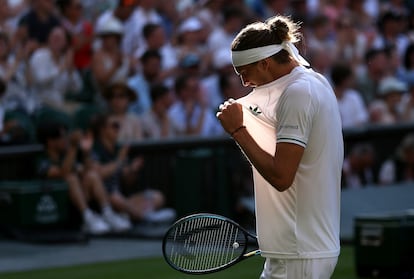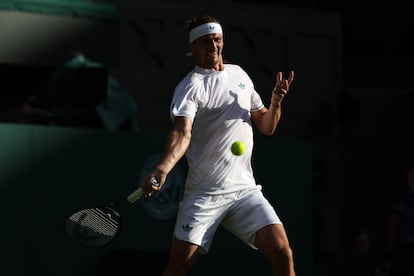Zverev’s loneliness: A question of character, a question of attitude
Sascha’s biggest handicap has been his unwillingness to compete and fight when things get tough, writes Toni Nadal

I just read Alexander “Sascha” Zverev’s statements after his surprising first-round defeat at Wimbledon, and they filled me with sadness. “I feel very alone out there at times. I struggle mentally [...] I’m trying to find ways to kind of get out of this hole, but I keep finding myself back in it. I feel generally speaking quite alone in life at the moment, which is a feeling that is not very nice.”
Even knowing these words are the product of a negative and temporary emotional state — stemming from recent results that don’t reflect his level or expectations — they clearly reveal the tension athletes experience, regardless of their status or ranking in the world.
This doesn’t mean that the German player doesn’t value his own achievements or the good fortune he’s had in life, but he is paying for not reaching the highest goals he’s capable of with a certain degree of unhappiness.
The first time I saw Sascha play, he was about 16 years old. It was at the Basel tournament, when he was sparring with my nephew. After practice, I called a friend who represented several tennis players and advised him to try to recruit him as well. I told him I saw in Zverev a future world number one.
The reality, however, is that after years of being tipped to succeed the Big Three and having been among the best for many years, he never quite made the definitive leap that would allow him to reach this coveted position.
The reasons for this have more to do with mental and emotional limitations than with any technical flaws in his tennis. As I’ve said and written on several occasions, the difference between Alexander, on the one hand, and Djokovic, Federer, or Rafael, on the other, doesn’t show when everyone is playing well — it shows when they’re playing badly.
The problem for Sascha is when things just aren’t working out. That’s when he usually loses. The other three, on the other hand, would often still find a way to win. They accepted adversity better and were able to turn a bad day into a victory.
Zverev’s biggest handicap has been his unwillingness to compete and fight when the going gets tough. On several occasions, his mental weakness has taken its toll and prevented him from overcoming difficult situations. I have a great deal of affection for him, and I wouldn’t want him to read this as criticism, but the truth is that all these years he hasn’t managed to correct what he needs in order to become a Grand Slam champion. And that — the passage of time without winning one — is what leads to his current frustration.
The emergence of players like Jannik Sinner and Carlos Alcaraz has only deepened his perception that things are becoming even harder for him, trapping him in a cycle that generates more self-doubt.

Once a tennis player has his shots, the differentiating factor is attitude, which depends on character. And character, just as strokes are trained, can also be improved. In this regard, the German has lacked daily work on himself, even as he was improving other aspects of his game.
In today’s world, sometimes because we’re flooded with information, we find it difficult to understand what is a priority and, therefore, what will determine a player’s future. In my opinion, Alexander should pay special attention to improving his self-control.
It’s not easy, because nothing in life is, but I believe following the guidance left by different thinkers would be a very good idea. Saint Augustine said: “It’s bad to suffer; it’s good to have suffered.” Goethe declared: “Talents are best nurtured in solitude; character is best formed in the stormy billows of the world.” And Aristotle left us with a maxim that, 2,300 years later, still helps those who manage to apply it: “Thought conditions action, action determines behavior, repeated behavior creates habits, habits structure character, and character determines destiny.”
Sign up for our weekly newsletter to get more English-language news coverage from EL PAÍS USA Edition
Tu suscripción se está usando en otro dispositivo
¿Quieres añadir otro usuario a tu suscripción?
Si continúas leyendo en este dispositivo, no se podrá leer en el otro.
FlechaTu suscripción se está usando en otro dispositivo y solo puedes acceder a EL PAÍS desde un dispositivo a la vez.
Si quieres compartir tu cuenta, cambia tu suscripción a la modalidad Premium, así podrás añadir otro usuario. Cada uno accederá con su propia cuenta de email, lo que os permitirá personalizar vuestra experiencia en EL PAÍS.
¿Tienes una suscripción de empresa? Accede aquí para contratar más cuentas.
En el caso de no saber quién está usando tu cuenta, te recomendamos cambiar tu contraseña aquí.
Si decides continuar compartiendo tu cuenta, este mensaje se mostrará en tu dispositivo y en el de la otra persona que está usando tu cuenta de forma indefinida, afectando a tu experiencia de lectura. Puedes consultar aquí los términos y condiciones de la suscripción digital.









































